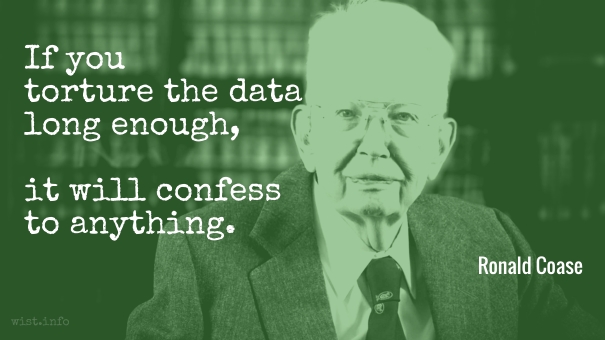It does not undo harm to acknowledge that we have done it; but it undoes us not to acknowledge it.
Mignon McLaughlin (1913-1983) American journalist and author
The Neurotic’s Notebook, ch. 4 (1963)
(Source)
Quotations about:
confession
Note not all quotations have been tagged, so Search may find additional quotes on this topic.
CAMILLO:My gracious lord,
I may be negligent, foolish, and fearful.
In every one of these no man is free,
But that his negligence, his folly, fear,
Among the infinite doings of the world,
Sometime puts forth. In your affairs, my lord,
If ever I were willful-negligent,
It was my folly; if industriously
I played the fool, it was my negligence,
Not weighing well the end; if ever fearful
To do a thing where I the issue doubted,
Whereof the execution did cry out
Against the non-performance, ’twas a fear
Which oft infects the wisest. These, my lord,
Are such allowed infirmities that honesty
Is never free of.William Shakespeare (1564-1616) English dramatist and poet
Winter’s Tale, Act 1, sc. 2, l. 310ff (1.2.310-325) (1611)
(Source)
Men will readily enough avow cruelty, passion, even avarice, but never cowardice, because such an admission would bring them, among savages and even in civilized society, into mortal danger.
[Les hommes avouent volontiers la cruauté, la colère, l’avarice même, mais jamais la lâcheté, parce que cet aveu les mettrait, chez les sauvages et même dans une société polie, en un danger mortel.]
Anatole France (1844-1924) French poet, journalist, novelist, Nobel Laureate [pseud. of Jaques-Anatole-François Thibault]
The Gods Will Have Blood [Les Dieux Ont Soif], ch. 19 [Brotteaux] (1912) [tr. Allinson (1913), The Gods Are Athirst]
(Source)
(Source (French)). Alternate translation:
Men willingly post of their cruelty, their anger, their greed even, but never of their cowardice, because to admit such a thing would put them, whether in a primitive or a civilized society, in mortal peril.
[tr. Davies (1979)]
There’s a reason narcissists don’t learn from mistakes and that’s because they never get past the first step, which is admitting that they made one.
Robert Hogan (b. 1937) American psychologist
In Jeffrey Kluger, The Narcissist Next Door, ch. 6 (2014)
(Source)
The United States has a system of taxation by confession. That a people so numerous, scattered and individualistic annually assesses itself with a tax liability, often in highly burdensome amounts, is a reassuring sign of the stability and vitality of our system of self-government. What surprised me in once trying to help administer these laws was not to discover examples of recalcitrance, fraud or self-serving mistakes in reporting, but to discover that such derelictions were so few.
Robert H. Jackson (1892-1954) US Supreme Court Justice (1941-54), lawyer, jurist, politician
United States v. Kahriger, 345 U.S. 36 (1953) [concurring]
(Source)
This is often misattributed to Hugo Black, who wrote a dissent in the case.
There is something which makes it more agreeable to condemn ourselves than to be condemned by others.
Abigail Adams (1744-1818) American correspondent, First Lady (1797-1801)
Letter to John Adams (19-20 Apr 1764)
(Source)
A candid admission of a blunder is refreshing and not often heard in human affairs. It is the saint alone who is large-minded enough to think and speak in this way. This is part of his authenticity.
Thomas Dubay (1921-2020) American Catholic priest, author, spiritual director
Authenticity: A Biblical Theology of Discernment, Part 2, ch. 6 (1977)
(Source)
If a man has reported to you that a certain person speaks ill of you, do not make any defense to what has been told you: but reply, The man did not know the rest of my faults, for he would not have mentioned these only.
Epictetus (c.55-c.135) Greek (Phrygian) Stoic philosopher
Enchiridion, 33 (c. AD 135) [tr. Long (1888)]
(Source)
Alt. trans.: "If anyone tells you that a certain person speaks ill of you, do not make excuses about what is said of you, but answer, 'He was ignorant of my other faults, else he would have not mentioned these alone.'" [tr. Higginson (1948)]
You daub your face and think I shall not see
Your wrinkles. You deceive yourself, not me.
A small defect is nothing when revealed;
But greater seems the blemish ill concealed.[Lomento rugas uteri quod condere temptas,
Polla, tibi ventrem, non mihi labra linis.
Simpliciter pateat vitium fortasse pusillum:
Quod tegitur, magnum creditur esse malum.]Martial (AD c.39-c.103) Spanish Roman poet, satirist, epigrammatist [Marcus Valerius Martialis]
Epigrams [Epigrammata], Book 3, epigram 42 (3.42) (AD 87-88) [tr. Pott & Wright (1921)]
(Source)
"To Polla." (Source (Latin)). Alternate translations:
Thou seek'st with lard to smooth thy wrinkled skin,
Bedaub'st thyself, and dost no lover win.
Simple decays men easily pass by,
But, hid, suspect some great deformity.
[tr. Killigrew (1695)]
Leave off thy Paint, Perfumes, and youthful Dress,
And Nature's failing honesty confess;
Double we see those Faults which Art wou'd mend,
Plain downright Ugliness would less offend.
[tr. Sedley (1702), "To Cloe"]
With lotion some wrinkles you labor to hide.
No policy, Polla, you show; but some pride.
A small fault perhaps might more safely appear:
Whatever is hid, draws construction severe.
[tr. Elphinston (1782), Book 6, Part 3, ep. 20]
When you try to conceal your wrinkles, Polla, with paste made from beans, you deceive yourself, not me. Let a defect, which is possibly but small, appear undisguised. A fault concealed is presumed to be great.
[tr. Bohn's Classical (1859)]
Seek not to hide a blemish that's but small.
The fault that's hidden ofttimes greater seems.
[ed. Harbottle (1897)]
You try to conceal your wrinkles by the use of bean-meal, but you plaster your skin, Polla, not my lips. Let a blemish, which perhaps is small, simply show. The flaw which is hidden is deemed greater than it is.
[tr. Ker (1919)]
Applying paste to smooth out the folds in your fat belly only means you are rouging your belly for yourself instead of your lips for me. It wouild be more natural to let that minor flaw stand. The hidden evil is considered worse.
[tr. Bovie (1970)]
You try to hide your belly's wrinkles with bean meal, Polla, but you smear your stomach, not my lips. Better that the blemish, perhaps a trifling one, be frankly shown. Trouble concealed is believed to be greater than it is.
[tr. Shackleton Bailey (1993)]
You use a cream your wrinkles to disguise,
But you're just pulling wool over our eyes.
The wrinkles, left alone, would draw no mention,
But, covered up, they draw closest attention.
[tr. Wills (2007)]
Conceal a flaw, and the world will imagine the worst.
[Source]
Get in line in that processional,
Step into that small confessional.
There the guy who’s got religion’ll
Tell you if your sin’s original.
If it is, try playin’ it safer,
Drink the wine and chew the wafer.
Two, four, six, eight,
Time to transubstantiate!
That’s not a nuts thing, that’s a “humans hate to admit error even as they stand there, black and smoldering, with the stub of a cigarette in one hand, in the middle of a wide crater containing them and the remains of a sign that once read ‘DANGER: VOLATILE EXPLOSIVES'” thing. It’s pretty universal.
James Nicoll (b. 1961) Canadian reviewer, editor
“Proposal for a new FAQ or two,” rec.arts.sf.written, Usenet (10 Jun 2005)
(Source)
A very desperate habit; one that is rarely cured. Apology is only egotism wrong side out. Nine times out of ten, the first thing a man’s companion knows of his short-comings is from his apology.
To keep your marriage brimming,
With love in the loving cup,
Whenever you’re wrong, admit it;
Whenever you’re right, shut up.Ogden Nash (1902-1971) American poet
“A Word to Husbands,” Marriage Lines: Notes of a Student Husband (1964)
(Source)
Forgiving our enemys haz the same refreshing effekt upon our souls az it duz tew confess our sins.
[Forgiving our enemies has the same refreshing effect upon our souls as it does to confess our sins.]
Josh Billings (1818-1885) American humorist, aphorist [pseud. of Henry Wheeler Shaw]
Everybody’s Friend, Or; Josh Billing’s Encyclopedia and Proverbial Philosophy of Wit and Humor, ch. 144 “Affurisms: Gnats” (1874)
(Source)
If thou confesseth thy Sins and amendest not, thou mocketh God.
Thomas Fuller (1654-1734) English physician, preacher, aphorist, writer
Introductio ad Prudentiam, # 661 (1725)
(Source)
If we say, ‘We have no sin,’ we are deceiving ourselves, and truth has no place in us; if we acknowledge our sins, he is trustworthy and upright, so that he will forgive our sins and will cleanse us from all evil.
The Bible (The New Testament) (AD 1st - 2nd C) Christian sacred scripture
1 John 1:8-9 [NJB (1985)]
(Source)
Alternate translations:
If we say we have no sin, we deceive ourselves, and the truth is not in us.
If we confess our sins, he is faithful and just, and will forgive our sins and cleanse us from all unrighteousness.
[KJV (1611)]
If we say we have no sin in us, we are deceiving ourselves and refusing to admit the truth; but if we acknowledge our sins, then God who is faithful and just will forgive our sins and purify us from everything that is wrong.
[JB (1966)]
If we say that we have no sin, we deceive ourselves, and there is no truth in us. But if we confess our sins to God, he will keep his promise and do what is right: he will forgive us our sins and purify us from all our wrongdoing.
[GNT (1976)]
If we claim, “We don’t have any sin,” we deceive ourselves and the truth is not in us. But if we confess our sins, he is faithful and just to forgive us our sins and cleanse us from everything we’ve done wrong.
[CEB (2011)]
If we say that we have no sin, we deceive ourselves, and the truth is not in us. If we confess our sins, he who is faithful and just will forgive us our sins and cleanse us from all unrighteousness.
[NRSV (2021 ed.)]
If there is any fixed star in our constitutional constellation, it is that no official, high or petty, can prescribe what shall be orthodox in politics, nationalism, religion, or other matters of opinion, or force citizens to confess by word or act their faith therein. If there are any circumstances which permit an exception, they do not now occur to us.
Robert H. Jackson (1892-1954) US Supreme Court Justice (1941-54), lawyer, jurist, politician
West Virginia State Board of Education v. Barnette, 319 U.S. 624 (1943) [majority opinion]
(Source)























